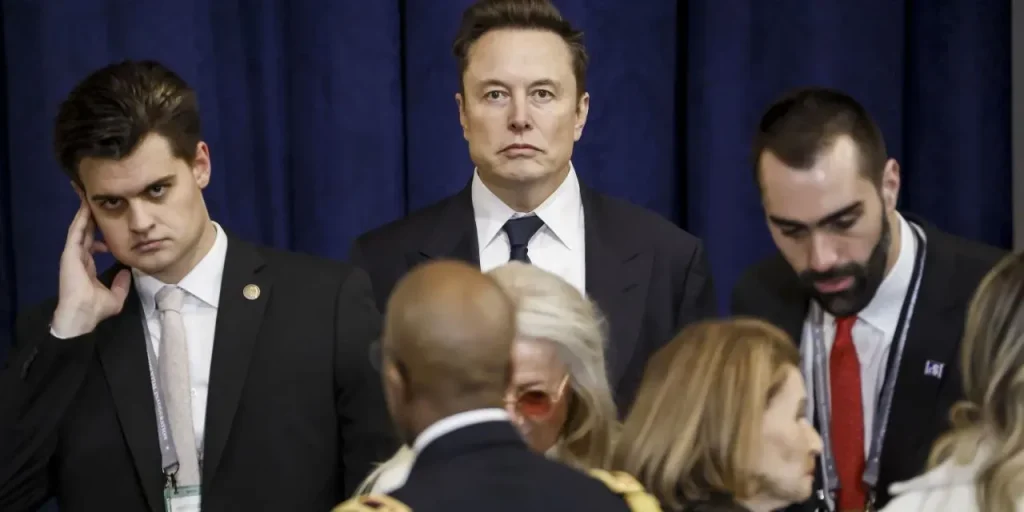In a surprising turn of events, Trump criticizes Musk after the Tesla CEO announced the formation of a new political party, the American Party. Trump called Musk’s recent actions “ridiculous,” expressing disappointment over the billionaire’s political ambitions that he believes have gone “completely off the rails.” This criticism marks a significant shift in the Trump Musk relationship, as the two once maintained a cooperative rapport during Trump’s presidency. The fallout stems from Musk’s vocal stance on issues like taxation and spending, highlighting the complexities within third party politics in the United States. With the American Party news making headlines, this clash raises questions about the impact of such movements on the traditional Republican and Democratic landscape.
In a bold move, Elon Musk has ventured into the realm of politics with his announcement of the American Party, a development that has caught the attention of Donald Trump. The conflict surrounding Musk’s political ambitions reflects a deeper tension between two influential figures, with Trump’s criticism highlighting the potential pitfalls of third party movements in American politics. As Musk positions himself against traditional party lines, the implications for both his business endeavors and his personal brand could be profound. The relationship between Trump and Musk, once marked by mutual support, now faces challenges as they navigate their differing visions for the American political landscape. With discussions around electric vehicle mandates and economic policies at the forefront, the ramifications of this rift could resonate far beyond the immediate sphere of their rivalry.
Trump Criticizes Musk’s Political Aspirations
In a recent Truth Social post, former President Donald Trump expressed his disapproval of Elon Musk’s announcement to form a new political party, which he described as ‘ridiculous.’ Trump’s comments highlight a growing divide between the former President and the Tesla CEO. Taking a firm stance, Trump stated that Musk has gone ‘completely off the rails’ in recent weeks, likening his actions to a ‘TRAIN WRECK.’ This criticism underscores the tension that has developed over issues of fiscal responsibility and political alignment, particularly as Musk’s new endeavor, the ‘American Party,’ seeks to disrupt traditional political frameworks.
Trump’s discontent with Musk’s political move is rooted in the belief that third parties, while appealing to some voters, contribute to social and political instability. He pointed out that losing focus on a unified approach could lead to significant electoral confusion. With an emphasis on the two-party system, Trump argues that supporting a third party like Musk’s could dilute the electoral power of Republicans, especially at a time when they are vying for a strong comeback. This public exchange not only reflects Trump’s frustration but also reveals broader concerns about the direction of American party politics.
The Formation of the American Party
Elon Musk’s announcement regarding the formation of the ‘American Party’ represents a radical shift in his political engagement. By stepping away from traditional party lines, Musk aims to present an alternative for voters disillusioned with the current Republican and Democratic structures. His declaration on social media stated that the party was established as a means to restore freedom to Americans, hinting at a broader critique of prevailing handlings of fiscal policy and governance. This initiative opens discussions around third party politics and their potential role in reshaping the American political landscape.
In forming the American Party, Musk is capitalizing on a growing sentiment among voters who feel that neither major party adequately represents their interests. The emphasis on fostering new political dynamics echoes throughout Musk’s communications, especially as he outlined issues he believed the existing parties mismanaged. However, critics of Musk’s party idea, including Trump and various political analysts, warn that such third party movements could lead to fragmented votes, thus jeopardizing electoral stability and success for reform-minded candidates.
Impact on Trump-Musk Relationship
The fallout from Musk’s announcement is particularly consequential for his relationship with Trump, once characterized by mutual support. Musk’s investment in Trump’s previous campaign indicated a camaraderie that now appears frayed. Trump’s public admonishments signal a stark reversal in their once-promising partnership. Furthermore, the creation of the American Party may be seen as a betrayal by some in Trump’s circle, given Musk’s previous endorsements and high-profile support of the former President’s policies.
This changing dynamic raises important questions about loyalty and collaboration in American politics. After previously partnering on various issues, including Musk’s appointment to head the Department of Government Efficiency, both figures now find themselves on opposing sides of a critical political debate. As Trump delineates his views on Musk’s recent actions, the potential for constructive dialogue seems diminished, further complicating any future collaborations that may have been on the table.
Concerns Over Third Party Politics
Trump’s warning against third party politics resonates with historical patterns in American elections, where third parties often create fractures in voter blocs. By establishing the American Party, Musk inadvertently runs the risk of undermining the Republican agenda in upcoming elections. Trump’s remarks underscore the inherent risks associated with third parties, suggesting that they may lead voters away from a consolidated effort to reclaim political power from Democrats. He reiterated that the Republican Party already faces enough challenges without the additional complication of a disruptive third option.
Critics of Musk’s initiative are concerned that the emergence of the American Party might siphon votes from established candidates, bolstering Democratic chances in tightly contested elections. This tension is indicative of a broader debate regarding the effectiveness of third parties in American politics. While Musk may believe that establishing a new political faction introduces much-needed diversity to the national conversation, many political strategists caution that the unpredictability and confusion surrounding third-party candidates can often discourage voter turnout and engagement.
Musk’s Critique of Trump’s Policies
The rift between Trump and Musk became evident when Musk openly criticized Trump’s tax and spending policies, implying that they could potentially lead to economic fallout. Musk’s formation of the American Party was framed as a response to what he perceives as fiscal irresponsibility, marking a significant departure from his previously supportive stance toward Trump’s administration. This shift in allegiance illuminates the complexities of Musk’s political ideology and raises pertinent questions about his future role in the political sphere.
Trump’s fiscal policies have been a cornerstone of his campaign strategies, and Musk’s critiques challenge the very foundation upon which those strategies were built. By creating an alternative party criticizing Trump’s approach, Musk positions himself as a progressive voice within the often-stagnant landscape of American politics. This growing divide reflects a deeper ideological conflict, as Musk seeks to carve out a new political identity, while Trump remains steadfast in his traditional Republican values.
Criticism from Investors and Allies
Musk’s foray into political leadership has not only drawn the attention of Trump but also raised concerns among investors and industry leaders. Key figures like James Fishback express apprehension over Musk’s commitment to Tesla amidst his political ambitions, highlighting potential conflicts of interest. Fishback has been vocal about delaying his firm’s initial public offering in response to Musk’s move, advising Tesla’s board to rein in Musk’s political pursuits for the sake of corporate stability.
The concern within Tesla’s investor community points toward the expectation of focused leadership at the helm of the company. As Musk embarks on this new political venture, critics warn that shifting his priorities could detract from Tesla’s operational goals and financial health. Given Musk’s prominent role in steering the company, maintaining stakeholder confidence while navigating the complex intersection of business and politics has become increasingly challenging.
Musk’s Vision for the Future of American Politics
Through the creation of the American Party, Musk is projecting a vision for a reinvigorated political framework that he believes could resonate with the American populace. Musk’s appeal to personal freedom and economic opportunity speaks to a desire for change in how political discourse is shaped. Part of his strategy includes criticizing longstanding practices among the major parties, reflecting a broader frustration with the political status quo and seeking to engage voters who feel disenfranchised.
Musk’s establishment of a new political platform might capture the imaginations of those yearning for alternatives. With a populist approach, he aims to mobilize grassroots support and challenge entrenched political norms. However, translating this vision into actionable political victories remains a daunting task, as historical efforts at launching successful third parties often struggle to maintain momentum in the face of established two-party dominance.
The Reaction from Political Analysts
The announcement of the American Party has prompted widespread analysis from political experts who are considering its implications for both the upcoming elections and the future of party dynamics in the U.S. Many analysts argue that while Musk’s initiative may attract attention, its viability in the political arena remains questionable. With historical precedence, third parties have often struggled to gain traction, and experts caution that without a clear and organized strategy, it risks being overshadowed by the established parties.
Political pundits also assert that the divisions created by Musk’s political maneuvers could ultimately lead to fragmented voting patterns. Such fragmentation could inadvertently favor Democrats, especially in battleground states where every vote counts. As analysts assess the potential impact of Musk’s American Party, it’s clear that while it may aim to disrupt, it could inadvertently reinforce the stronghold of the two-party system that Musk sought to challenge.
Tesla’s Future Amid Political Unrest
As Musk embarks on his latest political adventure with the formation of the American Party, questions arise about how this might affect Tesla’s future and the ongoing development of electric vehicles (EVs). Tesla, under Musk’s leadership, has been at the forefront of technology and innovation in the automotive industry. However, as political distractions mount, analysts fear that the focus on political campaigning might detract from advancing Tesla’s critical technologies and business objectives.
While the intention behind the American Party may be rooted in a desire for change, stakeholders in Tesla are looking for stability and continued growth in a competitive market. As Musk navigates the intersection between technology and politics, the overarching concern will be how this dual role affects Tesla’s ability to innovate and satisfy its consumers. Ensuring that political ambitions do not eclipse the core mission of Tesla remains crucial for both Musk and his team moving forward.
Frequently Asked Questions
What did Trump say about Musk forming a new political party?
Trump criticized Musk’s announcement of the ‘American Party,’ calling it ‘ridiculous’ and stating that Musk had gone ‘completely off the rails.’ Trump expressed concerns that third parties like Musk’s would create chaos in U.S. politics.
How has the Trump-Musk relationship changed recently?
The relationship between Trump and Musk has strained due to disagreements over Musk’s political moves and spending policies. Trump previously supported Musk during his presidency, but Musk’s formation of a third party has led to a dramatic fallout.
What is the American Party that Elon Musk announced?
The American Party, established by Elon Musk, aims to compete with the traditional Republican and Democratic parties. Musk claims it is formed to restore freedom to the American public, amid criticisms of existing political structures.
Why does Trump believe starting a third party is problematic?
Trump argues that introducing a third party like Musk’s ‘American Party’ adds confusion and chaos to the political landscape, which traditionally operates within a two-party system. He believes the Republican Party remains successful and doesn’t need division.
What are Trump’s views on Musk’s Electric Vehicle Mandate?
Trump has criticized Musk’s push for an Electric Vehicle Mandate, arguing that it would force Americans to buy electric cars and claiming to have eliminated tax credits for electric vehicles to counter such mandates during his presidency.
How does Musk’s announcement impact Tesla and its shareholders?
Musk’s new political party has drawn criticism from allies of Trump, who suggest that it could divert his focus from Tesla, potentially impacting the company’s performance and responsibilities to its employees and shareholders.
What were Musk’s criticisms of Trump’s policies leading to the formation of the American Party?
Musk has criticized Trump’s tax and spending plans, arguing that they could bankrupt the economy. His establishment of the ‘American Party’ is a reaction to these policies, aimed at presenting an alternative to the current political options.
| Key Point | Details |
|---|---|
| Trump’s Criticism | Trump called Musk’s formation of a new political party “ridiculous” and stated he has gone “off the rails.” He expressed sadness over Musk’s recent actions. |
| Musk’s Announcement | Musk announced the formation of the “American Party” on X, aimed at providing an alternative to the Republican and Democratic parties. |
| Disagreement Over Spending | Trump and Musk had a fallout over a spending bill, with Musk criticizing Trump’s policies which he believed would harm the economy. |
| Rejection of Third Parties | Trump believes starting a third party causes confusion, asserting that the Republican Party already has significant success. |
| Musk’s EV Mandate | Trump criticized Musk for advocating an “Electric Vehicle Mandate” that he claimed would force rapid adoption of electric cars. |
| Investor Response | Trump’s allies, such as James Fishback, criticized Musk’s new political engagements and its potential impact on Tesla’s focus. |
Summary
Trump criticizes Musk for his recent decision to form a new political party, labeling it as a move that has led him to go ‘off the rails’. This criticism highlights Trump’s concern over the disruption that third parties can create in the political landscape, emphasizing his belief in the strength of the traditional two-party system. The fallout from their disagreements over fiscal policies has led to significant tensions in what once was a supportive relationship.



